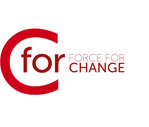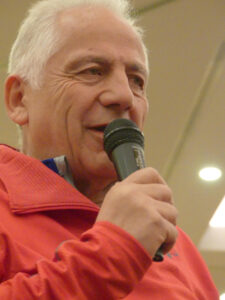I’ve been recalling the beginning of our own organisation, CFOR.
You might try it with your own projects or organisations. Because sometimes right at the beginning, the idea or seed that landed inside of you, and got you going, reminds you of who you are, or who you might become.
It started like this:
One afternoon I was in Kosovo sitting at a cafe with my colleagues Lane Arye and Tanja Radocaj. That was in 2001.
We’d been working since 1996 in Croatia, since just after the war, facilitating large 4-day forums, with people who had been on opposing sides of the violent conflict. Our focus was on conflict resolution, violence prevention and community development. The participants were able to do what first seemed impossible to them – talk among themselves about the real issues that divided and connected them, including processing heated conflict, so that they could work with the blocks to recovery in their communities. The groups represented all kinds of people, from mayors of small villages, to young people in youth organisations. Tanja had headed up that programme in its earlier days, and she was now at UNMIK UN Mission in Kosovo. We were asked to facilitate a day of forums in Pristina and Mitrovice.
One of the things that moves me still when I recall our time in Kosovo was how those so terribly traumatised by war held a deep wish to reach out and help others. And people who had never imagined having a vocation working with humanitarian needs or in social services were now terribly needed to help with post-war recovery. That afternoon in Kosovo, one person described trying to make contact with a man who was so traumatised, he was sitting vigilant by the door, without sleep, weapon in hand, and did not know the war was over. One man described spending the whole day trying to reach an old couple who were awaiting a stove. They lived on a farm that was very difficult to access. He had to go and tell them bad news – there was no stove. (There were repeated problems with the coordination of supplies for basic needs.) He had tears in his eyes as he told how he had spent the whole day travelling to their remote farm, and how the couple had fallen to their knees, kissing his hands, and thanking him for coming all the way to tell them the bad news. The story struck a chord in everyone at that forum. The need for a stove as the winter was coming is nothing to be sentimental about, nor the botched best efforts on the part of so many organisations trying to help in Kosovo – Still, what counted most was this human contact, that someone gave a damn ‘to go the mile’.
It was just after the war. We often saw vehicles that said SFOR Security Force, IFOR, and now KFOR Kosovo Force – these were UN forces with the role of protecting the peace. I remember the espresso, the barbed wire, the air, a KFOR vehicle and this idea landed…What about ‘CFOR’ Community Force.
Might communities become a protective force? We had seen the most extraordinary transformations in our large forums of 60-80 people in Croatia. I remember the charge in the atmosphere, the goose bumps and sober faces, when a man asked. “Can we dare to imagine what might have happened had we met like this BEFORE the war? And when a woman looked around the room and spoke…”If the events leading to war were to come again, God forbid, would the experiences that we have gone through together, the depth of our dialogue as Serbs, Croats and Muslims, the strength and depth of friendships that we have formed…would they sustain us, such that we could not be pulled apart like that ever again?” Could communities become a protective force? By way of facilitated interactions about how we are entangled in history. By way of processing the trauma and conflicts we have together and learning how our emotions are worked up and polarised in relation to one another. So that we cannot be so easily pulled apart in dramatic polarisations and violent conflict.
These underlying ideas have been working in me for many years and formed the basis of several articles and my book, The War Hotel: Psychological Dynamics in Violent Conflict, Whurr 2004/Wiley.
Jean-Claude and I had been facilitating community dialogue and forums since 1989, working together and with our colleagues. The programme in Croatia had begun in 1996. CFOR was founded in 2002. CFOR stood for Community Force, and later Force for Change. While the word ‘force’ often refers to power, might or even military, we liked to think of it more as a ‘life force’ that moves us in relation to each other, and ultimately links us. Our work is to facilitate and pass on facilitation skills, to support individuals, organisations, communities, and governments to access this potential within us to resolve conflict, prevent violence, and develop exciting and creative ways forward.
Our work puts us face to face with some of the most painful and difficult parts of human experience, but it also brings us in touch with an extraordinary potential in people that brings hope – not pie in the sky hope – but real hope in what could be possible.
We worked in Croatia from 1996-2002, and from 2006-2012, in programmes that were supported by the UNHCR, in tandem with our partner Udruga Mi, and supported by Dutch, Norwegian, Belgian, Danish , Spanish governments and EU funding. The later stages of our work particularly focused on the ‘Areas of Special State concern’ that had been devastated by war, in a programme that linked forums and economic recovery projects.
In addition to our work in Croatia, we’ve witnessed the potential of facilitated dialogue in many places and contexts – within small NGOs, international organisations and neighbourhood associations; within meetings among management, staff and board dealing with crisis in the National Health Services NHS; within our ‘Europe Matters’ conferences, gathering people from many countries and cultures to have a deeper dialogue about our history and future as multicultural societies; within ‘world work’ seminars in India, Slovakia, Greece, UK and USA; in a forum among the Diaspora community from Burundi; in forums to address violence in our communities, and mental health; in a forum on issues of migration, asylum and refuge; in forums on the Israeli-Palestinian conflict; in forums on issues facing Roma communities and the relationship between majority and minority communities in Slovakia and Europe; with groups working on the history of tyranny during the communist era and attitudes in Europe between the ‘west’ and eastern and central Europe; i in forums on the environment; in a London forum focused on Islamophobia and the experience of Muslims in Europe; in a forum on anti-semitism; and in forums focusing on issues of nation and ethnicity, race and racism, gender, sexual orientation, health and ability / disability, and more.
With a background in facilitation, psychology, systems thinking, and Processwork, which uniquely links psychological, spiritual and political frameworks, our work is about facilitating dialogue, relationship and awareness, and bringing awareness to its potential for conflict resolution, social action and for building capacity and cooperation within and across organisations and sectors. We have the pleasure to work with people in conflict resolution, human rights, education and health, farming and sports, with civil society, local authorities and government, grassroots and large organisations.
With such extensive and serious problems in so many places, it’s easy to sometimes wonder if your dream is just falling into a big sea of dreams… I know many people feel like this. It can help to recall the beginning when the dream landed – we need each other more than ever… As I get to the end of this entry, I can’t quite find a closure, so will just head back to work… thanks!
https://www.cfor.info
https://www.cfor.info/flyers/From_Seed_to_Fulfillment.pdf
https://www.facebook.com/pages/CFOR-Force-for-Change/121479547867666

